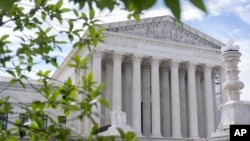The U.S. Supreme Court on Monday ordered lower courts to take another look at Republican-backed laws in Florida and Texas intended to limit social media companies from blocking content they find objectionable.
The ruling was announced on the Supreme Court’s final day of term.
Court justices asked lower appeals courts to reassess their decision on the laws that would permit states to regulate the way that social media platforms administer their content. Separate appeals courts reached opposite conclusions about whether the law was constitutional.
Trade groups in the tech industry originally challenged the Florida and Texas laws under the U.S. Constitution’s First Amendment for reasons involving free speech.
The challenging groups were NetChoice and the Computer & Communications Industry Association. Members of the groups include Meta Platforms, Google, which owns YouTube, and Snap, the owner of TikTok and Snapchat.
The issue involved the scope of the First Amendment, probing whether social media companies are protected against the government from having to publish content against their will. Companies have argued that without a level of screening, spam, bullying, extremism and hate speech would crowd their platforms.
President Joe Biden’s administration opposed the laws and supported social media companies in having editorial discretion under the First Amendment. Yet they encouraged a narrow ruling that would allow government regulation to maintain competition, ensure data privacy and protect consumers.
Republicans have argued that companies’ content moderation policies have been used as a guise for extinguishing conservative voices and have called the practice censorship.
Officials in Florida and Texas argued that the companies' content-moderation actions fall outside First Amendment protections because the actions are not speech themselves.
The law in Texas would prohibit large social media companies — ones with at least 50 million active users per month — from moving to “censor” users for their “viewpoint.”
The law in Florida would limit large platforms from excluding content, including banning a political candidate or “journalistic enterprise.”
The laws were signed by Republican governors in the months after Facebook, owned by Meta, and Twitter, now called X, removed Donald Trump from their platforms over his posts regarding the Jan. 6, 2021, attack on the United States Capitol by his followers.
Lower courts originally split on the laws, blocking important parts of the Florida law while permitting the Texas legislation. The litigation has prevented either law from going into effect.
The Supreme Court has dealt with free speech questions about the digital age this term.
It previously ruled that government officials who block social media critics can sometimes be sued and it rejected limits on how an administration can communicate with social media platforms.
Some information in this report came from The Associated Press and Reuters.





